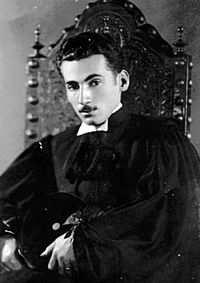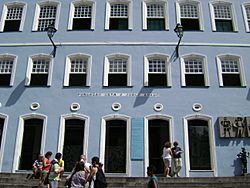Jorge Amado facts for kids
Quick facts for kids
Jorge Amado
|
|
|---|---|

Amado in 1935
|
|
| Member of the Chamber of Deputies | |
| In office 5 February 1946 – 10 January 1948 |
|
| Constituency | São Paulo |
| Personal details | |
| Born |
Jorge Leal Amado de Faria
10 August 1912 Itabuna, Bahia, Brazil |
| Died | 6 August 2001 (aged 88) Salvador, Bahia, Brazil |
| Political party | PCB (1932–1956) |
| Spouse | |
| Alma mater | Federal University of Rio de Janeiro (LL.B.) |
| Occupation | Writer, professor |
| Writing career | |
| Genre | Novel, crônica, fable, short story |
| Literary movement | Modernism |
| Notable works | Gabriela, Clove and Cinnamon, Dona Flor and Her Two Husbands, Tieta, Captains of the Sands |
| Relatives | Véra Clouzot (cousin) |
| Signature | |
 |
|
Jorge Amado (born August 10, 1912 – died August 6, 2001) was a famous Brazilian writer. He is one of the best-known modern Brazilian authors. His books have been translated into about 49 languages. Many of his stories have also been made into movies, like Dona Flor and Her Two Husbands.
Jorge Amado's stories often show a mix of cultures in Brazil. They also highlight different religions coming together. He wrote about a happy and hopeful Brazil, but also about the big social and economic problems people faced. He was a member of the Brazilian Academy of Letters from 1961 until he passed away. He also won the International Nonino Prize in Italy in 1984. For a short time, he was even a Federal Deputy (like a representative in government) for São Paulo.
Contents
Jorge Amado's Life Story
Jorge Amado was born on August 10, 1912. He grew up on a farm near the city of Itabuna in Brazil. His family later moved to Ilhéus, a coastal city, where he spent most of his childhood. He saw firsthand the hard lives of people working on cocoa farms. This experience inspired many of his books, like The Violent Land.
When he was 14, Jorge Amado started writing for magazines. He also helped start a group of young writers called the "Rebels' Academy."
Early Career and Challenges
Jorge Amado published his first novel, The Country of Carnival, when he was just 18 years old. He married Matilde Garcia Rosa and had a daughter named Lila. His second novel, Cacau, made him even more popular.
He studied law at the Federal University of Rio de Janeiro, but he never became a lawyer. Because of his political views, he faced difficulties from the government at the time. In 1935, he was arrested. A few years later, some of his books were even publicly burned. His works were banned in Portugal, but they became very popular in other parts of Europe. The famous writer Albert Camus praised his book Jubiabá.
Life in Exile and Return
In the early 1940s, Jorge Amado had to leave Brazil. He lived in Argentina and Uruguay for a while. When he returned to Brazil, he separated from his first wife. In 1945, he was elected to the National Constituent Assembly. This meant he helped create new laws for Brazil. He even signed a law that protected freedom of religion.
In 1945, he married another writer, Zélia Gattai. They had a son, João Jorge. Soon after, his political party was made illegal, and its members faced problems. Jorge Amado had to leave Brazil again, this time living in France until 1950. His daughter Lila passed away in 1949. From 1950 to 1952, Jorge Amado and Zélia Gattai lived in Czechoslovakia, where their daughter Paloma was born. He also visited the Soviet Union and received the Stalin Peace Prize in 1951.
Focus on Literature
When Jorge Amado returned to Brazil in 1954, he decided to focus only on writing. He left his political party a year later.
His writing style changed in 1958 with his book Gabriela, Clove and Cinnamon. This book was very popular and was called "the best example of a folk novel" by Jean-Paul Sartre. Jorge Amado started writing more about the traditions and beauty of Bahia, often focusing on strong female characters. Other famous books from this time include Dona Flor and Her Two Husbands and Tereza Batista: Home from the Wars.
On April 6, 1961, he was chosen to be a member of the Brazilian Academy of Letters. This is a very important group of writers and scholars in Brazil. After he passed away, his wife was elected to take his place.
Jorge Amado received many awards and honorary degrees from universities around the world. He was even honored by the Candomblé, an Afro-Brazilian religion. In 1984, he received the French Légion d’Honneur, a very high award from France.
His books have been translated into 49 languages and published in 55 countries. They have been made into movies, plays, and TV shows. Some of his stories even inspired samba schools during the Brazilian Carnival.
In 1987, the House of Jorge Amado Foundation was created in Salvador. This foundation helps protect his writings and promotes culture in Bahia. The building has a small museum and shows the covers of his books from around the world.
Jorge Amado passed away on August 6, 2001. His ashes were spread in the garden of his home a few days later. In 2014, he was honored again for his work in defending social rights.
His Amazing Books
Here are some of Jorge Amado's well-known books:
- The Country of Carnival (1931)
- Cacau (1933)
- Sweat (1934)
- Jubiabá (1935)
- Sea of Death (1936)
- Captains of the Sands (1937)
- The ABC of Castro Alves (1941)
- The Knight of Hope (1942)
- The Violent Land (1943)
- The Golden Harvest (1944)
- Bahia de Todos-os-santos (1945)
- Red Field (1946)
- The Bowels of Liberty trilogy (1954)
- Gabriela, Clove and Cinnamon (1958)
- The Double Death of Quincas Water-Bray (1959)
- Home Is the Sailor (1961)
- Ogum's Compadre (1964)
- Shepherds of the Night (1964)
- Dona Flor and Her Two Husbands (1966)
- Tent of Miracles (1969)
- Tereza Batista: Home from the Wars (1972)
- The Swallow and the Tomcat: A Love Story (1976)
- Tieta (1977)
- Pen, Sword, Camisole (1979)
- Showdown (1984)
- The War of the Saints (1988)
- Coasting (1992)
- The Discovery of America by the Turks (1994)
Images for kids
See also
 In Spanish: Jorge Amado para niños
In Spanish: Jorge Amado para niños



